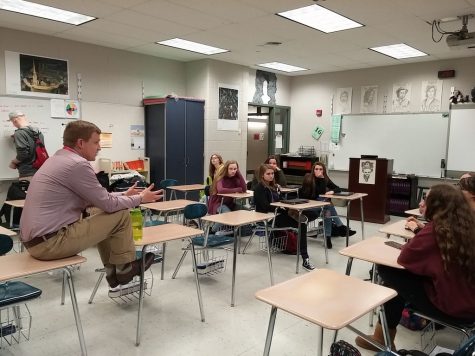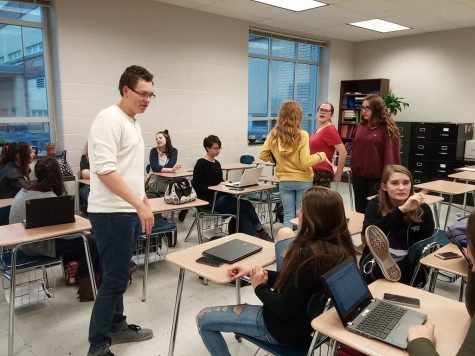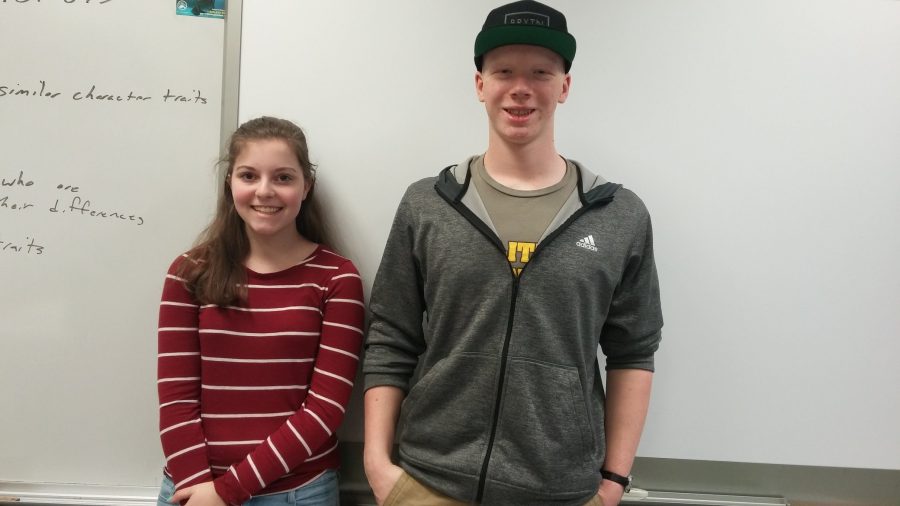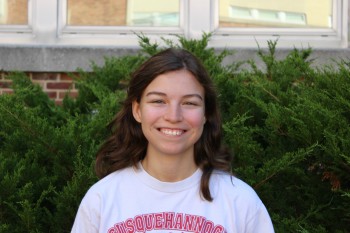National Art & Writing Contest Awards Two Susquehannock Freshmen
Freshmen Emily Heiser and Ian Achterberg won awards from this year’s National Scholastic Art & Writing contest. Photo by: Ariel Barbera
March 31, 2017
Two Susquehannock students have won National Scholastic Art and Writing Awards. Freshmen Ian Achterberg and Emily Heiser both won awards for their literary submissions in this year’s contest.
More than 330,000 works of art and writing from across the country are submitted to the National Scholastic Art and Writing Awards each year. For the second year in a row, two of Susquehannock’s students have won an award. Emily Heiser won a silver medal for her essay, “Africa: What Could Have Been” and Ian Achterberg won a gold medal for his personal essay, “The Meaning of Metathesiophobia.”
English teacher Timothy Groth is proud of his students for achieving national recognition and continues to inspire his students to write.
“I have Emily Heiser in honors ninth grade English. She is an excellent writer. The critical essay she wrote was based off her research paper on Africa, so she was able to take formal piece and research page writing and make it into a creative piece,” said Groth. “I also have Ian in honors ninth grade English. His piece was based off of his experiences of fostering dogs, so he wrote a personal essay based off his experiences and what he’s observed.”
Achterberg found inspiration for his essay from the life around him and will attend the meeting at Carnegie Hall to receive his reward.
“The main message of my essay is how people can change and how animals can change as the dog that I wrote about did, and how you can overcome fears,” said Achterberg. “What inspired me to write [the essay] was fostering dogs for OPH, and also being in the creative writing club and having other people around me pushing me into writing.”
Achterberg’s essay, “The Meaning of Metathesiophobia,” is about his family’s struggles of taking in a troubled foster dog named Hadley who was scared of nearly everything. Metathesiophobia means the “fear of change,” and Hadley was terrified of the new family taking care of her as well as overcoming this huge change of life. But overtime, the troubled dog grew used to her new home after a couple of weeks and became comfortable with her surroundings.

After over six weeks had passed by, Hadley was adopted by a man who had the similar problem of metathesiophobia as she did, and the Achterberg family was relieved to find they had succeeded in reviving the foster dog. Achterberg found Hadley to be the greatest inspiration for his essay and pointed out that metathesiophobia can exist in both humans and animals, and that everyone needs help overcoming their troubles.
Besides writing, Achterberg spends his free time playing soccer, track and field, playing video games on his computer and attending creative writing club meetings.
Heiser wrote an essay on the continent of Africa and was inspired to submit to the competition after learning about the topic in English class.
“[The essay] is about the slave trade in Africa and how it’s shaped the continent and made it into the poor continent it is today,” said Heiser. “I was writing my English paper, which was about Africa and the slave trade, so I took it from there and added onto it.”
Heiser’s essay, “Africa: What Could Have Been,” is about how the events of the slave trade led to the corruption of the whole continent. Heiser went into detail about how people had turned on each other and the continent is nothing but a war zone these days.

Civil wars break out today in countries Mozambique, Sudan, Libya and Angola. Heiser describes perfectly, “if the first world is rising into the 21st century, then Africa must be sinking farther back in time.” Africa deals with many issues in society, and the state of the continent is the main theme that Heiser tackles in her essay.
In her free time, Heiser enjoys reading and listening to music. Despite not being in the creative writing club, Heiser still finds enjoyment in writing.
The creative writing club is a workshop that focuses on helping students achieve goals in writing. Members of the club will help each other improve their writing as well as helping others achieve their goals.
“We spend the beginning part of the year discussing what people want to write for the competition, which the deadline is in December. We spend the beginning part of the year working on a work theory for people who need quiet time to sit down and actually focus working on some creative writing,” said Groth. “Other meetings we’ll get together and start a workshop. They sit down, read each other’s work and provide feedback. It’s an environment for people who have ideas.”
The creative writing club continues to help students who need help with work they plan on submitting to contests and the writing they create in their free time.





